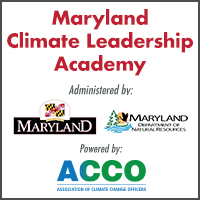Webinar Archives: State Agency Programs & Resources
Maryland Energy Administration
Maryland Smart Energy Communities
The Maryland Smart Energy Communities (MSEC) program is designed to support local governments as they voluntarily adopt clean energy policies. Attendees will hear from a variety of active participants in the MSEC program who will share some highlights from their projects and partnership working with the Maryland Energy Administration on climate and energy issues.
Energy Efficiency and Conservation
Learn about MEA programs to encourage reduced energy costs and greenhouse gas emission reductions through efficiency. MEA has a suite of grants and loans to help defray the costs of energy projects that reduce emissions. MEA also invests, via grants, in community organizations who are improving the efficiency of low-to-moderate income residents and non-profit organizations.
Clean Fuels and Transportation and Maryland Smart Energy Communities
Learn about funding opportunities to expand clean fuels infrastructure, including opportunities to help communities, businesses and residents expand EV infrastructure. Also learn about opportunities to help fleets and local governments defray some of the costs of transitioning to clean fuels.
Clean Energy and Resiliency Programs
Learn about funding opportunities, technical support and other efforts to install clean and resilient energy in homes, businesses and public institutions. MEA has a suite of grants and incentives that can achieve sustainability goals while building local resilience to power outages through solar, combined heat and power and more. Also learn about tax credits for energy storage.
Maryland Department of Emergency Management
Integrating Climate Change into Emergency Management
The Emergency Management discipline has continuously evolved to prepare, respond, recover, and mitigate impacts from emergencies and disasters. As climate change continues to alter the world we live in, the Maryland Department of Emergency Management has made resilience a cornerstone of the State’s emergency management program. MDEM is implementing forward leaning, multi-disciplinary solutions to shape a resilient Maryland where communities can thrive. This is achieved through traditional avenues, such as hazard mitigation and private sector integration, as well as new initiatives such as Maryland’s Food System Resiliency Council. Learn more about MDEM’s programs and initiatives aimed at prioritizing resilience and integrating climate change resilience into emergency management.
Resiliency through Restoration Initiative
In July 2017, the Department of Natural Resources launched a Resiliency through Restoration Initiative with the goal of using nature-based designs to help protect communities, economies and ecosystems from climate change impacts. As part of this Initiative, the Department provides financial and technical assistance to local government and non-profit partners through the Community Resilience Grant.
Attendees will hear from various partners who have supported Initiative projects in different phases of assessment, design, and construction. Presenters will share their experiences, anticipated outcomes, and how these projects address climate resiliency.
Maryland Department of Natural Resources
Innovative Ecological Restoration Practices to Stand Up to Climate Change
With more than 3,000 miles of shoreline, Marylanders are accustomed to living in and around water. In Annapolis and many coastal communities, high tide or “nuisance” flooding has increased dramatically since the start of the century, and scientists expect that trend to continue as rising water and sinking land impacts these low-lying areas. More frequent and stronger rain events have caused devastation and disruption in coastal and non-coastal communities alike.
As climate change impacts our communities and economies with more water and changing coastlines, we can work with nature to adapt strategically and sustainably. Natural systems grow and change, becoming more robust and effective over time. These features help mitigate greenhouse gases by taking in carbon dioxide.
Attendees will hear from state agency experts, project partners, and practitioners about restoration techniques being implemented in our state that appear to be better at responding to climate pressures and demonstrate how nature-based solutions can enhance community resilience to the impacts of climate change.
Local Government Case Studies
In 2019-2020, the City of Annapolis and Queen Anne’s, Charles, and Anne Arundel Counties partnered with the University of Maryland’s Center for Global Sustainability to establish the Climate Resilience Planning and Financing Workgroup. Through this collaboration, identified important assets, as well as the processes and actions that must be taken to protect those assets. The workgroups also took the first steps in creating innovative, effective, and efficient planning and financing processes and systems that will be necessary for achieving climate change resilience goals.
This precedent-setting engagement activity allowed communities to collaborate and coordinate to address climate challenges in ways they never had before. Join us for a webinar featuring key staff from each community sharing their experiences, challenges, benefits and lessons-learned.
